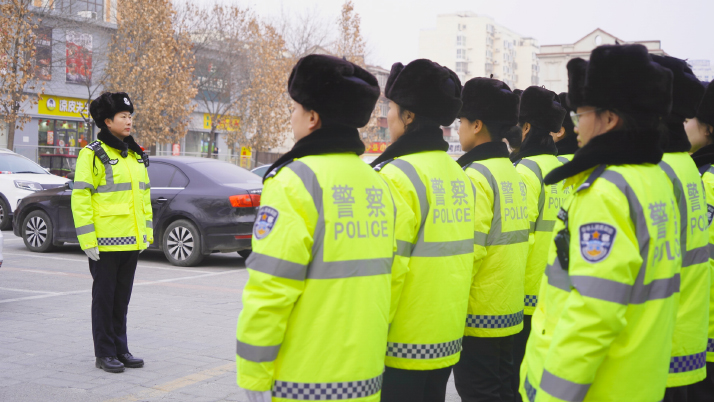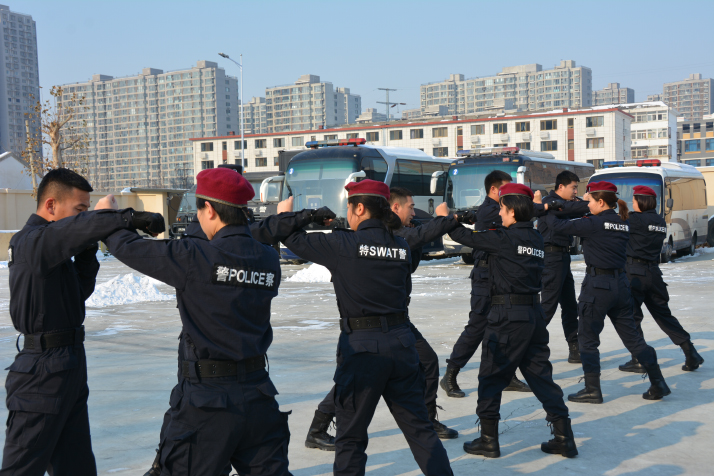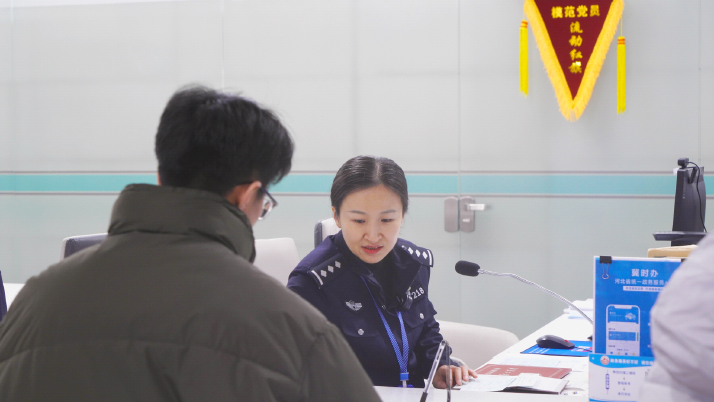| China |
| The call of duty | |
|
|
|
|
|
Li Tengfei, a traffic police officer in Sanhe, a small city in the northern Chinese province of Hebei, is now in her 27th year of public service. But she still remembers a note her son wrote many years ago when he was little.
"It read, 'The soaked rice in the pot has swollen too much to cook, but my mother still isn't home yet.' I was always too late to make and have dinner with him. As I ran my fingers across his big, messy scribblings, I just felt for him," Li told Beijing Review, adding that her son had gotten used to her busy work schedule as a child. Owing to Sanhe's unique geographical position, Li's work is very demanding. The city lies east of Beijing's Tongzhou District and right across the Chaobai River, one of the borders between Beijing and neighboring Hebei. With its convenient location—a 40-minute car drive into Beijing's downtown districts—and comparatively low cost of living, hundreds of thousands of people working in Beijing choose to live in Sanhe and commute to and from the capital every day, creating huge traffic flow. "National Highway 102 serves as the direct connection between Beijing and Sanhe, and the traffic flow on this road is a staggering 410,000 trips per day. The traffic running along this route is our priority, especially during peak hours," Li said. To prepare for the morning rush hour, which starts at around 7:30, Li and her team have to start getting ready at least one hour earlier. For its evening equivalent, they work in shifts. "Some young mothers have to sneak out of their home very early in the morning, when their kids are still asleep; other mothers came home too late to catch up with their family over dinner. It's a year-round routine. And we're always on duty for major holidays, such as the Spring Festival [or Chinese New Year holiday from February 10 to 17 this year]," Li said.  Li Tengfei, a traffic police officer, and her team members prepare for the evening rush hour in Sanhe City, Hebei Province, on February 4 (YIN KANG)
Commitment From Li's perspective, the holiday traditions of the average traffic police officer slightly differ from those of other people, because their work never ends. "During holidays, the city will host many festive events and the traffic flow is even higher, which means more traffic police officers need to be deployed around these venues. In addition, the main roads are being monitored even more closely than usual to prevent traffic accidents," she explained. Luan Bo, a police officer at the service center in Sanhe's Yanjiao Town, said they usually work extra hours in the lead-up to and during the Spring Festival, China's biggest annual holiday and a time for family reunion, to help people with all kinds of licenses and certificates. "The Spring Festival is a time for many families to go on big trips and this requires them to promptly obtain certain certificates, think vehicle management documents or registration papers. To ensure that they can embark on their trip on time, we don't even stop for lunch—just in case anyone walks in," Luan told Beijing Review. "The one-stop service here makes it easier for people to apply for the certificates they need," she elaborated. "They can literally walk into our center to get everything sorted."  Female members of the patrol team in Sanhe hone their hand-to-hand combat skills with male colleagues (YIN KANG)
This year's festival period proved business as usual for Luan and her colleagues. The service center also opened an online reservation service and fast-track channels to speed up the related processes. Over at the Command Center of the Sanhe Public Security Bureau, officer Geng Jinying is just as busy as her peers at the service hall. The center is responsible for receiving public inquiries, complaints and calls for help, as well as for mobilizing police forces to handle emergencies and violent crimes. "People can call 110 or 122 (the Chinese mainland's emergency numbers) to reach out to us 24/7. The officers at the center work 12-hour shifts so there's always someone to answer the phone," Geng told Beijing Review, right as one of her colleagues got a call for help related to online fraud. The center's officers spend their days and nights at the public's beck and call. "When we have people thank us, we feel our work has paid off, especially during big holidays, when we've sacrificed our own opportunities to spend time with family," Geng said.  Luan Bo helps a resident with registration documents at the service center in Sanhe's Yanjiao Town on February 5 (YIN KANG)
She power Most of Geng's team members are female police officers; some of them are newlyweds, others are mothers, but all are equally hardworking. "At work, female police officers are not held to a different standard from male police officers. We all, for example, have to take an annual physical fitness test—no exceptions," Geng said. The high-intensity fitness test consists of a combination of activities related to law enforcement duties in the field and is designed to showcase an officer's flexibility, endurance, strength and determination. "I personally like to do some strength training after work to stay in shape all year round," Geng added. Bai Jing, a police officer in the patrol team of the Sanhe Public Security Bureau, is well trained in the use of warning devices and lifesaving skills. "Patrol officers are deployed around the city's schools, malls, markets and other places with high population density to oversee the public's safety, and we have experience in managing different situations," Bai told Beijing Review. Despite their tough approach to the job, these female police officers have unique advantages over their male peers. The art of being gentle with those in need of assistance is one of them. "Women, children and seniors are more relaxed when they talk to us, and they mostly prefer asking us for help," Bai said. "For example, children can easily lose sight of their family members in malls, and they will come to us for help. They'll say 'Auntie, I can't find my mother.' Male police officers perhaps look a bit more formidable, whereas female officers give off a sense of gentleness and warmth." Traditionally in China, women tend to be more associated with family matters than men. But that stereotype does not apply to these policewomen. "I'm not a typical working mom because I work longer hours than most of my peers. The kids are usually taken care of by my parents and my husband at home. I don't spend a lot of time with my children, but I know I'm their role model—my 7-year-old daughter has already made it clear that she, too, wants to commit to public service when she grows up, and my son dreams of becoming a police officer," Luan said. "They are proud of me." According to Bai, the female members of her team are proud of their contributions to public safety. "Balancing work and life is hard, but it is our choice to serve the greater, public good," Bai said. Copyedited by Elsbeth van Paridon Comments to zhangyage@cicgamericas.com |
|
||||||||||||||||||||||||||||
|